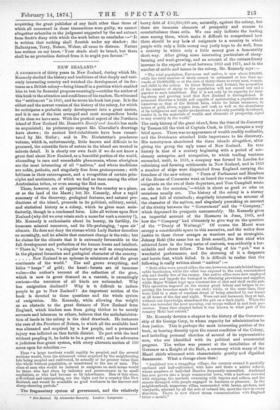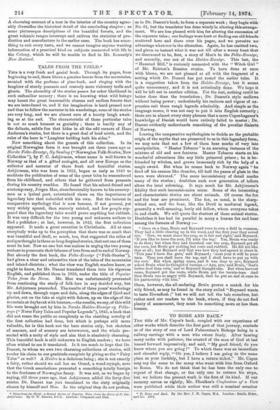NEW ZEALAND.*
A RESIDENCE of thirty years in New Zealand, during which Mr. Kennedy studied the history and traditions of that deeply and vari-
ously interesting country and watched the development of its for- tunes as a British colony—being himself in a position which enabled him to test its financial progress unerringly—entitles the author of this book to the attention and confidence of his readers. He witnessed the " settlement "in 1840, and he wrote his book last year. It is the oldest and the newest version of the history of the colony, for which he anticipates a probable early development into a great nation, and it is one of the best arranged and most compendious books of its class we have seen. With the poetical aspect of the Northern island of New Zealand Mr. Domett's Ranolf and Amohia has made us acquainted ; its picturesque aspect Mr. Chevalier's drawings have shown ; its ancient bird-inhabitants have been resusci- tated by Mr. 'Buller ; and in Dr. Hochstetter's ponderous volume, which is, unfortunately, little known and difficult to be procured, the scientific facts of nature in the island are treated in sminute detail. It is clearly our own fault if we do not know a great deal about New Zealand, as a beautiful portion of the world, abounding in rare and remarkable phenomena, whose aborigines are the most interesting of all "natives," and whose traditions are noble, pathetic, and singularly free from grotesqueness ; with loftiness in their extravagance, and a recognition of certain prin- ciples and sentiments, of which we find no trace among the other Australasian tribes, or even among the Red men.
These, however, are all appertaining to the country as a place, or as the land of the Maori ; but Mr. Kennedy, after a rapid summary of the discovery, geological features, and natural pro- ductions of the island, proceeds to its political, military, social, and statistical history as a colony, which he gives most satis- factorily, though in a condensed form. Like all writers upon New
Zealand (why did we ever retain such a name for such a country ?), Mr. Kennedy is enthusiastic about its beauty, its fertility, its immense mineral resources, and its life-prolonging, open air' climate. He does not deny the storms which Lady Barker describes so amusingly, and he admits that constant change is the rule ; but he claims for the climate that it is extremely favourable to the full development and perfection of the human frame and intellect. 4‘ There is," he says, "a singular variety as well as completeness in the physical formation and geological character of the country.
. . . . New Zealand is an epitome in miniature of all the great continents of the world." The soil grows everything, and hides " heaps" of gold ; the kauri - forests are of immense value—the author's account of the collection of the gum, which is now in great demand as a varnish, is exceedingly curious—the resources of all kinds are unbounded. Why has emigration declined ? Why is it difficult to induce people to go to New Zealand ? An important section of the book is devoted to these questions and the whole system of emigration. Mr. Kennedy, while allowing due weight as an obstacle to the great distance of New Zealand from England, which hinders men from going thither to be merely servants and labourers to others, believes that the maladministra- tion of lands in the colony is the chief drawback. He instances the case of the Province of Nelson, in which all the available land was alienated and acquired by a few people, and a permanent injury was inflicted on that fertile district. To part with the land without peopling it, he holds to be a great evil ; and he advocates a judicious free-grant system, with every alternate section of 100 acres open for selection :-
Thus "a largo territory would rapidly be peopled, and the several sections would, from the enhanced value acquired by the neighbouring lots being peopled and cultivated, be actually of far greater value than the whole without population, or unsubclued to the use of man. The class of men who would be induced to emigrate on such terms would be those who had risen by industry and perseverance to be small capitalists, or who had become so by inheritance. Men of this class, self-reliant and enterprising, are the right sort for a country like New Zealand, and would be available as good workmen in the harvest and sheep-shearing periods."
The fragmentary system of government, and the relatively
* New Zealand, By Alexander Kennedy. London : Longman& ,
heavy debt of £10,000,000 are, naturally, against the colony, but there are immense elements of prosperity and success to counterbalance these evils. We can only indicate the leading
ones among them, which make it difficult to comprehend how there should be any lacli of emigrants to a country in which
people with only a little money may justly hope to do well, from a country in which only a little money goes a lamentably short way. After giving some interesting particulars of sheep- farming and wool-growing, and an account of the extraordinary increase in the export of wool between 1860 and 1871, and in the number of cattle and horses in the colony, Mr. Kennedy says :—
" The total population, European and native, is now about 800,000, while the total number of sheep cannot be estimated at loss than up- wards of 10.000,000, or at the rate of thirty-three to every man, woman, and child in the colony. In Groat Britain and Ireland, the proportion of the number of sheep to the population will not exceed one and a quarter to each inhabitant. But it is not only by its capacity for feed- ing sheep and growing wool that Now Zealand is distinguished. It possesses likewise a fertile soil capable of maintaining a population as numerous as that of the British Isles, while its latent resources, in mines of gold, silver, copper, iron, and coal, as well as the abundance of its indigenous and exotic productions, as yet only partially developed, render it, in the materials of wealth and elements of prosperity, equal to any country in the world."
The early history of the great island, from the time of its discovery
by Tasman till the visit of Captain Cook, in 1769, occupies a very brief space. There was no appearance of wealth readily realisable, and the Dutchman attached little importance to his discovery.
His countrymen abandoned the three islands altogether, after giving the group the ugly name of New Zealand. Its true history is that of a century beginning with a period of mis- sionary enterprise and occupation, to which trading ventures succeeded, until, in 1838, a company was formed in London for colonising and forming settlements in New Zealand, and in 1839 a number of ships were dispatched from England carrying the founders of the new colony. " Peers of Parliament and Members of the House of Commons went on board the vessels to address the emigrants on the eve of their departure, and Tom Campbell wrote an ode on the occasion,"—which is about as good as odes on occasions usually are. The history of the colony is a stormy one, and full of vicissitude ; singularly interesting on account of the character of the natives, and singularly provoking on account of the rivalry between the "Government" and the "Company," which depressed its prospects unreasonably. Mr. Kennedy gives an impartial account of the Massacre in June, 1843, and how the "Company" had ultimately to give way on the question of the "Treaty of Waitangi." Of course the Maori wars occupy a considerable space in this narrative, and the writer does justice to these clever savages as warriors and as strategists. Johnny Heki (the name has an Irish sound), the first chief who achieved fame in the long series of contests, was evidently a for- midable and clever fellow. The building of his "pah" was a wonderful performance, and the storming bf it a desperate and heroic feat, which failed. It is difficult to realise that the following is really written about "natives" :—
" Both sides were armed alike ; the one, however, was safe behind impas- sable barricades, while the other was exposed to the cool, concentrated
aim and deadly fire of the enemy. Our native allies were now employed to harass and impede the besieged in obtaining provisions and supplies, while Major Wilmot kept up a constant fire of shot and shell on the pah. This operation imposed on the enemy great labour and fatigue in re- pairing the breaches made by our shot ; whilo, at the same time, they were held in a state of constant dread of being attacked by our troops at all hours of the clay and night. Worn out and harassed, they at last, without our knowledge, abandoned the pah on a dark night. When the fact was revealed the next morning, our troops walked in and took pos- session. Some time elapsed before it was known to what part of the country Heki had retired."
Mr. Kennedy devotes a chapter to the history of the Governor- ship of Sir George Grey, to whose capacity for administration he does justice. This is perhaps the most interesting portion of the book, as bearing directly upon the recent condition of the Colony, and including personal sketches of several of its representative men, who are identified with its political and commercial progress. The writer was present at the installation of the Governor as a Knight of the Bath, a ceremony which many of the Maori chiefs witnessed with characteristic gravity and dignified demeanour. What a change since then !
"Auckland was a straggling village, the country around it partially enclosed and half-cultivated, with here and there a native wharie, whore numbers of half-clad Maories frequently assembled. Auckland has now grown into a largo commercial town, with a harbour crowded with shipping, the markets swarming with buyers and sellers, and the streets thronged with people engaged in business or pleasure. In the neighbourhood, numerous villas, surrounded with lawns, gardens, and vineyards, adorned by all the arts of refined life, moot the view in every direction. There is now direct steam communication with England twice a month." A. charming account of a tour in the interior of the country agree- ably diversifies the historical detail of the concluding chapter ; as some picturesque descriptions of the beautiful forests, and the great volcanic ranges interrupt and enliven the statistics of pro- duction and manufacture in the earlier ones. The book has some- thing to suit every taste, and we cannot imagine anyone wanting information of a practical kind on subjects connected with life in the Colony, which he will be unable to find in Mr. Kennedy's New Zealand.



































 Previous page
Previous page